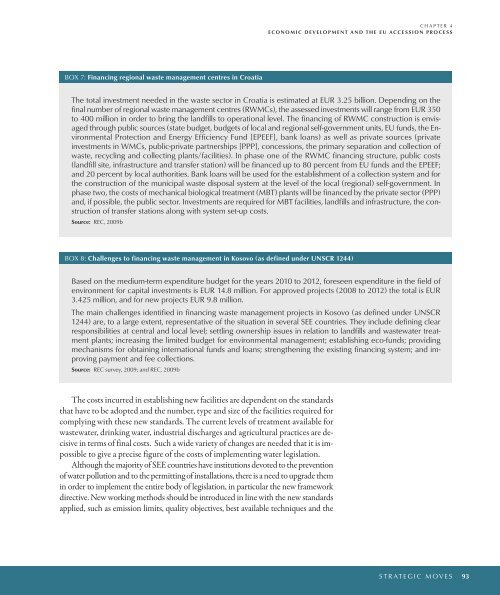Strategic Moves - Regional Environmental Center for Central and ...
Strategic Moves - Regional Environmental Center for Central and ...
Strategic Moves - Regional Environmental Center for Central and ...
Create successful ePaper yourself
Turn your PDF publications into a flip-book with our unique Google optimized e-Paper software.
BOX 7: Financing regional waste management centres in Croatia<br />
The costs incurred in establishing new facilities are dependent on the st<strong>and</strong>ards<br />
that have to be adopted <strong>and</strong> the number, type <strong>and</strong> size of the facilities required <strong>for</strong><br />
complying with these new st<strong>and</strong>ards. The current levels of treatment available <strong>for</strong><br />
wastewater, drinking water, industrial discharges <strong>and</strong> agricultural practices are decisive<br />
in terms of final costs. Such a wide variety of changes are needed that it is impossible<br />
to give a precise figure of the costs of implementing water legislation.<br />
Although the majority of SEE countries have institutions devoted to the prevention<br />
of water pollution <strong>and</strong> to the permitting of installations, there is a need to upgrade them<br />
in order to implement the entire body of legislation, in particular the new framework<br />
directive. New working methods should be introduced in line with the new st<strong>and</strong>ards<br />
applied, such as emission limits, quality objectives, best available techniques <strong>and</strong> the<br />
C H A P T E R 4<br />
E C O N O M I C D E V E L O P M E N T A N D T H E E U A C C E S S I O N P R O C E S S<br />
The total investment needed in the waste sector in Croatia is estimated at EUR 3.25 billion. Depending on the<br />
final number of regional waste management centres (RWMCs), the assessed investments will range from EUR 350<br />
to 400 million in order to bring the l<strong>and</strong>fills to operational level. The financing of RWMC construction is envisaged<br />
through public sources (state budget, budgets of local <strong>and</strong> regional self-government units, EU funds, the <strong>Environmental</strong><br />
Protection <strong>and</strong> Energy Efficiency Fund [EPEEF], bank loans) as well as private sources (private<br />
investments in WMCs, public-private partnerships [PPP], concessions, the primary separation <strong>and</strong> collection of<br />
waste, recycling <strong>and</strong> collecting plants/facilities). In phase one of the RWMC financing structure, public costs<br />
(l<strong>and</strong>fill site, infrastructure <strong>and</strong> transfer station) will be financed up to 80 percent from EU funds <strong>and</strong> the EPEEF;<br />
<strong>and</strong> 20 percent by local authorities. Bank loans will be used <strong>for</strong> the establishment of a collection system <strong>and</strong> <strong>for</strong><br />
the construction of the municipal waste disposal system at the level of the local (regional) self-government. In<br />
phase two, the costs of mechanical biological treatment (MBT) plants will be financed by the private sector (PPP)<br />
<strong>and</strong>, if possible, the public sector. Investments are required <strong>for</strong> MBT facilities, l<strong>and</strong>fills <strong>and</strong> infrastructure, the construction<br />
of transfer stations along with system set-up costs.<br />
Source: REC, 2009b<br />
BOX 8: Challenges to financing waste management in Kosovo (as defined under UNSCR 1244)<br />
Based on the medium-term expenditure budget <strong>for</strong> the years 2010 to 2012, <strong>for</strong>eseen expenditure in the field of<br />
environment <strong>for</strong> capital investments is EUR 14.8 million. For approved projects (2008 to 2012) the total is EUR<br />
3.425 million, <strong>and</strong> <strong>for</strong> new projects EUR 9.8 million.<br />
The main challenges identified in financing waste management projects in Kosovo (as defined under UNSCR<br />
1244) are, to a large extent, representative of the situation in several SEE countries. They include defining clear<br />
responsibilities at central <strong>and</strong> local level; settling ownership issues in relation to l<strong>and</strong>fills <strong>and</strong> wastewater treatment<br />
plants; increasing the limited budget <strong>for</strong> environmental management; establishing eco-funds; providing<br />
mechanisms <strong>for</strong> obtaining international funds <strong>and</strong> loans; strengthening the existing financing system; <strong>and</strong> improving<br />
payment <strong>and</strong> fee collections.<br />
Source: REC survey, 2009; <strong>and</strong> REC, 2009b<br />
S T R AT E G I C M O V E S 93






